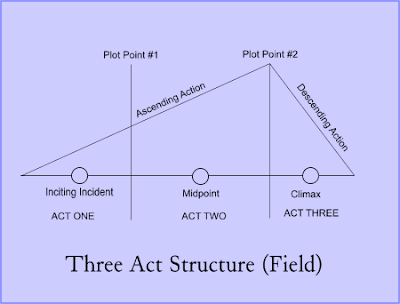 |
| Syd Field's classic Three Act Structure |
I was listening to some
Public Image Ltd. and writing a blog about Cameron Crowe when I decided to take a detour and read
Syd Field's Screenplay: The Foundations of Screenwriting. Well, yes. You don't know this about me, but I love to read about the craft of screenwriting. Check out the graphic above -- Syd is known for his three-act structure. (You would do well to learn it.) I was inspired to read the text by an Internet search engine. See, Google has been reading my email and gathering information about me when I run searches. That's fine, you can snoop if you like. Writers are always snooping on people, listening to their conversations, stealing turns-of-phrases which sound not only clever to the ear, but look pleasant on the page. I had never read this seminal book by Field and I knew that I could always come back to the Crowe blog because well, I am in charge here. I try to be in charge, but there are times when I am swept by inspiration to new directions. Today's distraction was provided by the Internets premier search.
 |
| Snoops. |
Google, or "
Big Brother," had suggested this particular Syd Field text after spying on me as I wrote an email to a friend about a screenplay that I was writing. (Yes, I have multiple projects, I told you this. I'm not a put-my-eggs-all-in-one-basket writer.) My colleague had encouraged me to
release the caged tiger -- as she referred to the project. I smiled, I knew it was a large scale project that I could manage to rein in, if I had a plan. I needed help.
I didn't click on the advertisement because I wouldn't give Google the satisfaction. I merely headed over to the
Cleveland Public Library website and ordered the text. It arrived days later and I was surprised by what I discovered on the opening pages of the first chapter, "What is a Screenplay
?".
 |
| Page 17 |
Well, Mr. Field, you have my attention. Joseph Mankiewicz, and Fitzgerald in one paragraph!
 |
| Page 17 |
|
|
|
 |
| Joan Crawford never starred in a Fitzgerald script -- Joseph Mankiewicz rewrote it. |
My favorite author,
F. Scott Fitzgerald was a bust as a screenwriter. Writing skill in one medium apparently doesn't translate to another one. While in Hollywood, Fitzgerald wrote to make money and according to Field,
to seek redemption. He died without getting that redemption. Syd Field writes: "Talent is God's gift; either you've got it or not. But writing is a personal responsibility; either you do it or you don't." (Page 14) Well, Fitzgerald was talented and it was well-known that his lifestyle had ruined what was a brilliant career -- he had failed in that personal responsibility that Field's what was talking about in his text.
 |
| Page 16 |
|
Acquiring Field's book was a stroke of genius by Google. I doubt they knew about my affinity for Fitzgerald; but wait, they do provide the platform for this blog. Google brought together Fitzgerald and Wilder! Maybe snooping on me was a good thing. Here's something you don't know about me: I believe that the intersection of Billy Wilder, Joseph L. Mankiewicz and F. Scott Fitzgerald was divinely orchestrated.


